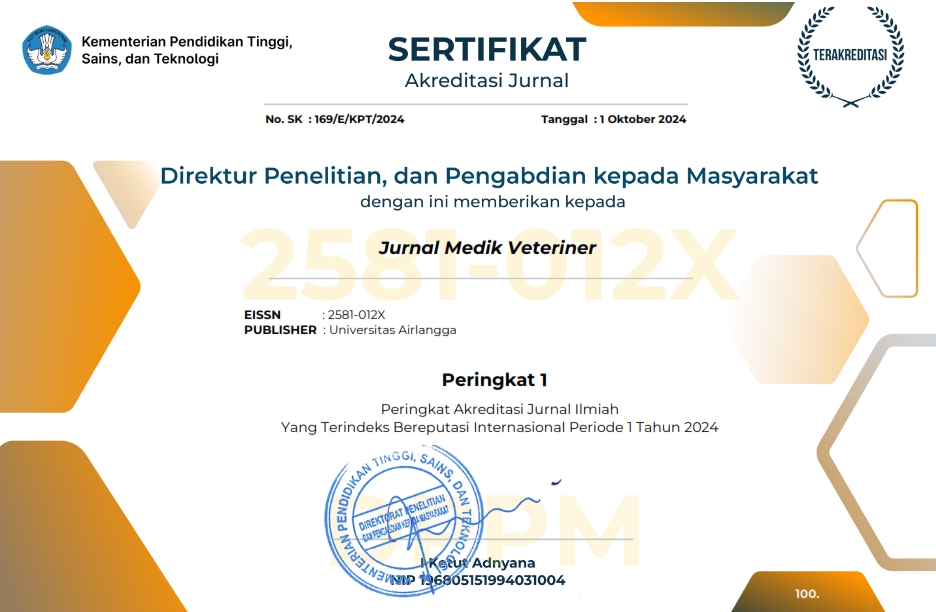Genomic Characterization of Antimicrobial Resistance Genes in Pasteurella multocida Isolates from East Nusa Tenggara and Lampung, Indonesia

Downloads
Haemorrhagic Septicaemia (HS) is a devastating disease affecting cattle and water buffaloes in Indonesia, causing annual economic losses in livestock industries, particularly in Asia, Africa, and the Middle East. Pasteurella multocida, the causative agent of the disease, has shown increasing antimicrobial resistance, complicating treatment efforts. Therefore, this study aims to provide the first genomic analysis of P. multocida isolates from different Indonesian provinces, focusing on genes conferring resistance to beta-lactam antibiotics based on Whole Genome Sequencing (WGS) results. Genomic data can be used to confirm the results of phenotypic antibiotic resistance testing. P. multocida isolates analyzed in this study were sourced from the Indonesian Research Center for Veterinary Science (IRCVS) collection, which included 2 samples originating from different geographic locations within Indonesia. The samples were subjected to biochemical, molecular, and antimicrobial susceptibility testing. WGS was performed using Oxford Nanopore Technologies (ONT) with subsequent bioinformatics analysis for genome assembly and resistance profiling. Phenotypic analysis showed significant variations between the isolates. The NTT isolate showed resistance to Penicillin, while the Lampung 2952 remained susceptible in the disk antibiotic test. Genome sequencing revealed extensive resistance determinants, including β-lactamase genes (blaZ, blaR1) in the NTT isolate, correlating with its phenotypic resistance. The high-quality genome assemblies (N50: 17,225 bp for NTT; 12,662 bp for Lampung 2952) enabled comprehensive resistome characterization, identifying more than 22 resistance genes in each isolate, including novel variants not previously reported in Indonesian strains. Therefore, this study provides the first genomic and resistance analysis based on Whole Genomic Sequencing data of Indonesian P. multocida isolates. The results show the urgent need for enhanced surveillance and prudent antimicrobial use in livestock management.
Abraham, E. P., & Chain, E. (1988). An enzyme from bacteria able to destroy penicillin. 1940. Reviews of Infectious Diseases, 10(4), 677–678.
Alcock, B. P., Raphenya, A. R., Lau, T. T. Y., Tsang, K. K., Bouchard, M., Edalatmand, A., Huynh, W., Nguyen, A. V., Cheng, A. A., Liu, S., Min, S. Y., Miroshnichenko, A., Tran, H. K., Werfalli, R. E., Nasir, J. A., Oloni, M., Speicher, D. J., Florescu, A., Singh, B., Faltyn, M., Hernandez-Koutoucheva, A., Sharma, A. N., Bordeleau, E., Pawlowski, A. C., Zubyk, H. L., Dooley, D., Griffiths, E., Maguire, F., Winsor, G. L., Beiko, R. G., Brinkman, F. S. L., Hsiao, W. W. L., Domselaar, G. V., & McArthur, A. G. (2020). CARD 2020: antibiotic resistome surveillance with the comprehensive antibiotic resistance database. Nucleic Acids Research, 48(D1), D517–D525.
Berek, H. S. D., Nugroho, W. S., & Wahyuni, A. E. T. H. (2015). Protectivity Against Septicemia Epizootica of Cows in Kupang District. Jurnal Veteriner, 16(2), 167–173.
Cimmino, T., & Rolain, J. M. (2016). Whole genome sequencing for deciphering the resistome of Chryseobacterium indologenes, an emerging multidrug-resistant bacterium isolated from a cystic fibrosis patient in Marseille, France. New Microbes and New Infections, 12(1), 35–42.
De Coster, W., D’Hert, S., Schultz, D. T., Cruts, M., & Van Broeckhoven, C. (2018). NanoPack: Visualizing and processing long-read sequencing data. Bioinformatics, 34(15), 2666–2669.
Desem, M. I., Handharyani, E., Setiyono, A., Safika, S., Subekti, D. T., & Ekawasti, F. (2023). Morphology, Biochemical, and Molecular Characterization of Pasteurella multocida Causing Hemorrhagic Septicemia in Indonesia. Veterinary Medicine International, 2023(1), 7778707.
Fikri, F., Wardhana, D. K., Purnomo, A., Khairani, S., Chhetri, S., & Purnama, M. T. E. (2022). Aerolysin gene characterization and antimicrobial resistance profile of Aeromonas hydrophila isolated from milkfish (Chanos chanos) in Gresik, Indonesia. Veterinary World, 15(7), 1759–1764.
Gauba, A., & Rahman, K. M. (2023). Evaluation of Antibiotic Resistance Mechanisms in Gram-Negative Bacteria. Antibiotics (Basel), 12(11), 1590.
Gomes, L. C., Campino, S., Marinho, C. R. F., Clark, T. G., & Phelan, J. E. (2021). Whole genome sequencing reveals large deletions and other loss of function mutations in Mycobacterium tuberculosis drug resistance genes. Microbial Genomics, 7(12), 000724.
He, F., Zhao, Z., Wu, X., Duan, L., Li, N., Fang, R., Li, P., & Peng, Y. (2021). Transcriptomic Analysis of High- and Low-Virulence Bovine Pasteurella multocida in vitro and in vivo. Frontiers in Veterinary Science, 8(1), 616774.
Horadagoda, N. U., Hodgson, J. C., Moon, G. M., Wijewardana, T. G., & Eckersall, P. D. (2001). Role of endotoxin in the pathogenesis of haemorrhagic septicaemia in the buffalo. Microbial Pathogenesis, 30(3), 171–178.
Jahnen, J., Hanke, D., Kadlec, K., Schwarz, S., & Krüger-Haker, H. (2025). Antimicrobial Resistance in Pasteurella multocida Isolates from Bovine Mastitis Can Be Associated with Multidrug-Resistance-Mediating Integrative and Conjugative Elements (ICEs). Antibiotics, 14(2), 153.
Jian, Z., Zeng, L., Xu, T., Sun, S., Yan, S., Yang, L., Huang, Y., Jia, J., & Dou, T. (2021). Antibiotic resistance genes in bacteria: Occurrence, spread, and control. Journal of Basic Microbiology, 61(12), 1049–1070.
Kawasaki, M., Young, J. R., Suon, S., Bush, R. D., & Windsor, P. A. (2015). The Socioeconomic Impacts of Clinically Diagnosed Haemorrhagic Septicaemia on Smallholder Large Ruminant Farmers in Cambodia. Transboundary and Emerging Diseases, 62(5), 535–548.
Koren, S., Walenz, B. P., Berlin, K., Miller, J. R., Bergman, N. H., & Phillippy, A. M. (2017). Canu: scalable and accurate long-read assembly via adaptive k-mer weighting and repeat separation. Genome Research, 27(5), 722–736.
Korotetskiy, I. S., Shilov, S. V., Kuznetsova, T., Kerimzhanova, B., Korotetskaya, N., Ivanova, L., Zubenko, N., Parenova, R., & Reva, O. N. (2023). Analysis of Whole-Genome Sequences of Pathogenic Gram-Positive and Gram-Negative Isolates from the Same Hospital Environment to Investigate Common Evolutionary Trends Associated with Horizontal Gene Exchange, Mutations and DNA Methylation Patterning. Microorganisms, 11(2), 323.
Kutzer, P., Szentiks, C. A., Bock, S., Fritsch, G., Magyar, T., Schulze, C., Semmler, T., & Ewers, C. (2021). Re-Emergence and Spread of Haemorrhagic Septicaemia in Germany: The Wolf as a Vector? Microorganisms, 9(9), 1999.
Lestari, T. D., Khairullah, A. R., Damayanti, R., Mulyati, S., Rimayanti, R., Hernawati, T., Utama, S., Wardhani, B. W. K., Wibowo, S., Kurniasih, D. A. A., Ma’ruf, I. F., Moses, I. B., Lisnanti, E. F., Ahmad, R. Z., Fauziah, I., Amalia, N., Fauzia, K. A., & Kusala, M. K. J. (2025). Hemorrhagic septicemia: A major threat to livestock health. Open Veterinary Journal, 15(2), 519–532.
Livermore, D. M. (2008). Defining an extended-spectrum beta-lactamase. Clinical Microbiology and Infection, 14(Suppl 1), 3–10.
Matheou, A., Abousetta, A., Pascoe, A. P., Papakostopoulos, D., Charalambous, L., Panagi, S., Panagiotou, S., Yiallouris, A., Filippou, C., & Johnson, E. O. (2025). Antibiotic Use in Livestock Farming: A Driver of Multidrug Resistance? Microorganisms, 13(4), 779.
Michael, G. B., Kadlec, K., Sweeney, M. T., Brzuszkiewicz, E., Liesegang, H., Daniel, R., Murray, R. W., Watts, J. L., & Schwarz, S. (2012). ICEPmu1, an integrative conjugative element (ICE) of Pasteurella multocida: Analysis of the regions that comprise 12 antimicrobial resistance genes. Journal of Antimicrobial Chemotherapy, 67(1), 84–90.
Millan, A. S., Escudero, J. A., Gutierrez, B., Hidalgo, L., Garcia, N., Llagostera, M., Dominguez, L., & Gonzalez-Zorn, B. (2009). Multiresistance in Pasteurella multocida is mediated by coexistence of small plasmids. Antimicrobial Agents and Chemotherapy, 53(8), 3399–3404.
Moustafa, A. M., Seemann, T., Gladman, S., Adler, B., Harper, M., Boyce, J. D., & Bennett, M. D. (2015). Comparative Genomic Analysis of Asian Haemorrhagic Septicaemia-Associated Strains of Pasteurella multocida Identifies More than 90 Haemorrhagic Septicaemia-Specific Genes. PLoS One, 10(7), e0130296.
Nurliana, Karmil, T., Ferasyi, T., Darmawi, Razali, Sugito, Rastina, & Ismail. (2019). Identification of Risk Factors and Seroprevalence For Septicemia Epizootica (SE) Endemic Case Of Buffaloes in Aceh Barat, Aceh. Proceedings of the Conference of the International Society for Economics and Social Sciences of Animal Health - South East Asia 2019 (ISESSAH-SEA 2019). 19(1), 106–110.
OIE. (2021). Haemorrhagic septicaemia (Pasteurella multocida) serotypes 6:B and 6:E. Mannual, 1–17.
Prihandani, S. S., Noor, S. M., Wibawan, I. W. T., Safika, Purba, H. H. S., Sumirah, & Kusumawati, A. (2022). Polymerase chain reaction to confirm biochemically characterization method of Pasteurella multocida isolate from fatal cases of Septicaemia epizootica in Nusa Tenggara Timur. IOP Conference Series: Earth and Environmental Science, 976(1), 012046.
Rahimzadeh, G., Ghezljai, N., Rezai, S., Rezai, R., Navaiefar, M. R., Rezai, M. S., Moradi, M., & Shakeri, M. (2024). Updating the Antimicrobial Resistance Pattern among Critical Priority Pathogens in the Intensive Care Unit in Northern Iran Post COVID-19 Pandemic. Advanced Biomedical Research, 13(1), 123.
Rosenau, A., Labigne, A., Escande, F., Courcoux, P., & Philippon, A. (1991). Plasmid-mediated ROB-1 beta-lactamase in Pasteurella multocida from a human specimen. Antimicrobial Agents and Chemotherapy, 35(11), 2419–2422.
Sabsabi, M. A., Zakaria, Z., Abu, J., & Faiz, N. M. (2021). Molecular characterisation and antibiotic sensitivity profile of Pasteurella multocida isolated from poultry farms in Malaysia. Austral Journal of Veterinary Sciences, 53(2), 121–126.
Seemann, T. (2014). Prokka: Rapid prokaryotic genome annotation. Bioinformatics, 30(14), 2068–2069.
Simão, F. A., Waterhouse, R. M., Ioannidis, P., Kriventseva, E. V., & Zdobnov, E. M. (2015). BUSCO: Assessing genome assembly and annotation completeness with single-copy orthologs. Bioinformatics, 31(19), 3210–3212.
Wilson, B. A., & Ho, M. (2013). Pasteurella multocida: From Zoonosis to cellular microbiology. Clinical Microbiology Reviews, 26(3), 631–655.
Zhu, D., He, J., Yang, Z., Wang, M., Jia, R., Chen, S., Liu, M., Zhao, X., Yang, Q., Wu, Y., Zhang, S., Liu, Y., Zhang, L., Yu, Y., You, Y., Chen, X., & Cheng, A. (2019). Comparative analysis reveals the Genomic Islands in Pasteurella multocida population genetics: on Symbiosis and adaptability. BMC Genomics, 20(1), 63.
Copyright (c) 2025 Sri Suryatmiati Prihandani, I Wayan Teguh Wibawan, Susan Maphilindawati Noor, Fitrine Ekawasti, Aswin Rafif Khairullah, Hastuti Handayani S. Purba, Alif Rahman Rohim Puarada, Safika Safika

This work is licensed under a Creative Commons Attribution-NonCommercial-ShareAlike 4.0 International License.
Authors who publish in this journal agree to the following terms:
1. The journal allows the author to hold the copyright of the article without restrictions;
2. The journal allows the author(s) to retain publishing rights without restrictions;
3. The legal formal aspect of journal publication accessibility refers to Creative Commons Attribution-NonCommercial-ShareAlike 4.0 International License (CC BY-NC-SA).






11.jpg)




















